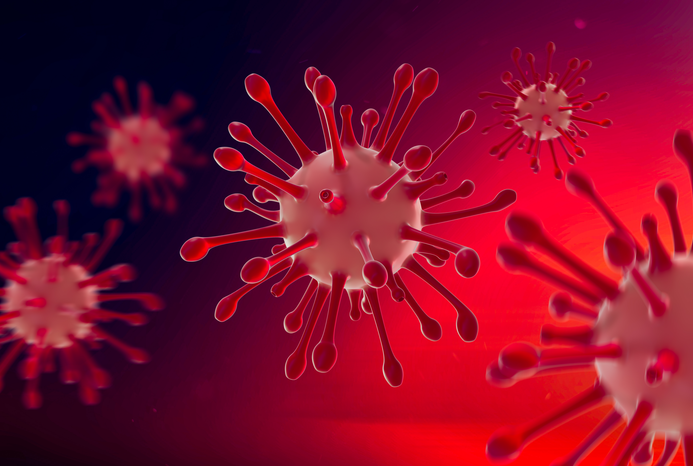A new preclinical study by Weill Cornell Medicine investigators found that certain bacteria in the gut may reduce susceptibility to SARS-CoV-2 infection, improve the immune response and prevent blood clots that can occur in severe COVID-19 illness. The study, published Aug. 1 in Gut Microbes, suggests that dietary choices may also have the potential to enhance efforts to combat COVID-19 and its complications in humans.
The composition of the gut microbiome has previously been linked to varying outcomes for health conditions such as inflammatory bowel disease, asthma, COPD and influenza. The investigators, led by senior author Dr. Melody Zeng, assistant professor of immunology in pediatrics in the Department of Pediatrics and a member of the Gale and Ira Drukier Institute for Children’s Research at Weill Cornell Medicine, believed that the same might be true for COVID-19.

From left: Drs. Katherine Sanidad, Melody Zeng and Julia Brown.
“We found, in animal studies, that molecules produced by gut bacteria can affect susceptibility to SARS-CoV-2 infection, the robustness of the immune response to the virus and the tendency to form harmful blood clots in COVID-19,” said Dr. Zeng.
The investigators began by examining how gut bacteria affect the levels of the ACE2 receptor, which acts like an open door for the SARS-CoV-2 virus to enter cells. The investigators found that in mice bred to have no or reduced gut bacteria, ACE2 receptor levels were elevated, making it easier for the virus to infect the lungs and intestines. The team then went on to isolate and identify the specific gut bacteria whose presence resulted in reduced levels of ACE2. They found that these fiber-fermenting bacteria, including Clostridia and Bacteroides, produced short-chain fatty acids (SCFAs) that curbed the expression of the ACE2 receptor in the lungs and intestines of male mice. Furthermore, hamsters that had a fiber-rich diet that enriched these bacteria, or mice given SCFAs in drinking water, were less susceptible to intranasal SARS-CoV-2 infection.
A strong immune system allows the body to make powerful antibodies that help clear viral pathogens. The team further discovered that SCFAs enhanced the ability of infected male mice to make antibodies that target the spike protein of SARS-CoV-2. Part of the protection of COVID vaccines relies on the generation of long-lasting spike-specific antibodies to help clear the SARS-CoV-2 virus rapidly when we are infected in the future.
Some people with underlying conditions, however, may be unable to make large amounts of these protective antibodies following vaccination. “Our study suggests that these people may benefit from a fiber-rich diet, which enriches the beneficial bacteria that make SCFAs, to help enhance their antibody response to the vaccines; but additional research is needed,” said Dr. Zeng. Of note, the effects of SCFAs on the ACE2 receptor or antibody response to SARS-CoV-2 were observed only in male animals. The sex-biased effects of SCFAs in this context remain poorly understood.
Dr. Zeng’s team also found that feeding mice SCFAs stifles the physiological impulse to form clots as a way to stop bleeding. They found SCFAs reduce the proliferation of a specific type of bone marrow cells, megakaryocytes, which make platelets that accelerate blood clotting in response to infection. In humans, this healthy response, known as coagulation, can sometimes take a dangerous turn, triggering strokes or heart attack when blood clotting isn’t turned off properly and leads to blood clots in major arteries.
Among people with severe COVID-19, blood clots in the lungs are a common problem. “This really impacts their ability to breathe and have oxygen exchange in the lungs,” Dr. Zeng said. Microclots have been suggested to contribute in part to long COVID. “Our mouse study suggests SCFAs from beneficial bacteria can regulate critical pathways for blood clots in a favorable way.”
Anticoagulant medications are currently a standard way to prevent blood clots in people at risk for strokes, but they have many side effects and can be ineffective in some cases. Dr. Zeng and her colleagues hope their discoveries can be harnessed not only to enhance our immune responses in viral infection, but to provide a natural way of controlling blood coagulation. This could be an attractive alternative treatment for excessive coagulation in people with cancer or infectious diseases.
“We are learning just how far-reaching our gut microbiome is,” said Dr. Julia A. Brown, a postdoctoral associate in pediatrics who is co-first author on the study along with postdoctoral associate Dr. Katherine Sanidad. “Even though bacteria stay in the intestines, their effect ripples beyond the intestines through various molecules gut bacteria release. For example, in our study, we found SCFAs from gut bacteria affect bone marrow cells that make platelets to control coagulation, or lung cells that express the ACE2 receptor for the virus to get inside the cells.”
“Our study suggests that prophylactic measures to enrich beneficial gut bacteria, such as a fiber-rich diet, may improve the outcome when a person is infected by SARS-CoV-2. But a lot more studies, including clinical studies, are needed before we know the extent of protection by SCFAs or a fiber-rich diet against COVID-19,” said Dr. Zeng.
Based on the findings from this study, Dr. Zeng’s team is currently exploring the potential of using SCFAs to treat hypercoagulation.
Dr. Melody Zeng filed a pending provisional patent application for SCFAs and Sh2b3 in the treatment of coagulation.

